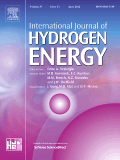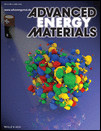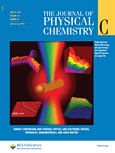
INTERNATIONAL JOURNAL OF HYDROGEN ENERGY
Scope & Guideline
Pioneering Research for a Hydrogen-Powered Future
Introduction
Aims and Scopes
- Hydrogen Production Technologies:
Research on various hydrogen production methods including electrolysis, thermochemical cycles, and biomass conversion, emphasizing efficiency and sustainability. - Hydrogen Storage Solutions:
Innovative approaches to hydrogen storage, including metal hydrides, MOFs, and carbon-based materials, focusing on capacity, kinetics, and safety. - Electrocatalysis and Photocatalysis:
Development of new electrocatalysts and photocatalysts for hydrogen evolution reactions, with a focus on enhancing performance and stability. - Hydrogen Applications in Energy Systems:
Integration of hydrogen into existing energy systems, including fuel cells, hybrid systems, and renewable energy sources, for sustainable energy solutions. - Environmental and Economic Impact Analysis:
Assessment of the environmental and economic implications of hydrogen technologies, including life cycle analysis and techno-economic evaluations. - Safety and Risk Management:
Studies on the safety aspects of hydrogen production, storage, and utilization, including risk assessments and mitigation strategies.
Trending and Emerging
- Green Hydrogen Production:
Increasing research focused on sustainable hydrogen production methods, including water electrolysis powered by renewable energy sources, reflects a global push towards decarbonization. - Advanced Electrocatalysis:
Emerging interest in the development of highly efficient electrocatalysts for hydrogen production, particularly those based on non-precious metals and novel nanostructures. - Hydrogen in Transportation:
Growing research on hydrogen fuel cell applications in transportation, particularly in heavy-duty vehicles, maritime applications, and aviation, is becoming more prominent. - Hydrogen as a Carbon Neutral Fuel:
Research exploring the role of hydrogen as a carbon-neutral fuel in various sectors, including power generation and industrial processes, is gaining traction. - Hydrogen Utilization in Energy Systems:
Innovative studies on integrating hydrogen into existing energy systems, including hybrid systems that combine hydrogen with other renewable energy sources, are emerging as a key focus area.
Declining or Waning
- Traditional Hydrogen Production Methods:
Research on conventional methods such as steam methane reforming is decreasing as focus shifts to greener and more sustainable hydrogen production technologies. - Low-Temperature Hydrogen Storage:
Interest in low-temperature hydrogen storage solutions is waning as researchers explore more efficient and high-capacity storage materials. - Hydrogen Combustion Studies:
Publications related to hydrogen combustion in traditional engines are declining, reflecting a shift towards fuel cell applications and cleaner technologies. - Basic Theoretical Studies:
There is a noticeable decline in purely theoretical studies that do not have direct practical applications, as researchers prioritize experimental and applied research. - Small-Scale Hydrogen Applications:
Research focusing on small-scale hydrogen applications is diminishing as the field moves towards large-scale industrial applications and renewable energy integration.
Similar Journals

JOURNAL OF THE ELECTROCHEMICAL SOCIETY
Advancing Electrochemical Innovation for a Sustainable FutureJOURNAL OF THE ELECTROCHEMICAL SOCIETY, published by the ELECTROCHEMICAL SOCIETY INC, is a leading peer-reviewed academic journal dedicated to advancing the field of electrochemistry and its myriad applications. With an ISSN of 0013-4651 and E-ISSN of 1945-7111, this esteemed journal has been a pivotal platform for research since its inception in 1948, with convergence periods allowing for a rich historical context of study through to 2024. Recognized for its high impact, it holds a noteworthy Q1 ranking in several categories including Condensed Matter Physics and Materials Chemistry, and it is Q2 ranked in both Electrochemistry and Renewable Energy. This journal features a range of articles that encompass both theoretical and experimental advancements, making it a crucial resource for researchers, professionals, and students keen on exploring cutting-edge developments in materials science, energy solutions, and sustainable technologies. Although it is not an open access journal, its rigorous standards ensure that published work significantly contributes to the body of knowledge within its fields, fostering innovative research and collaborative progress.

Nafta-Gaz
Fostering Dialogue on Energy Policy and Technological ProgressNafta-Gaz is a leading academic journal published by the Institute of Oil and Gas, dedicated to advancing the fields of energy engineering, environmental engineering, fuel technology, and geosciences. With a strong emphasis on both theoretical and applied research, this journal serves as a critical resource for professionals, researchers, and students looking to deepen their understanding of contemporary challenges in oil, gas, and renewable energy sectors. Though currently categorized in the Q4 quartile across several relevant disciplines, including Energy Engineering and Geophysics, Nafta-Gaz is committed to fostering innovative discussions and pragmatic solutions that pertain to energy management, environmental policy, and technological advancements. Published in Poland, Nafta-Gaz is positioned amid the rapidly evolving energy landscape, providing a platform for the exchange of knowledge and best practices. The journal does not currently operate under an open access model, ensuring that content is curated for a specialized audience while maintaining the integrity of scholarly communication.

Advanced Energy Materials
Empowering Innovation in Energy SolutionsAdvanced Energy Materials is a leading academic journal published by WILEY-V C H VERLAG GMBH, focusing on the rapidly evolving fields of materials science and renewable energy technologies. With an impressive impact factor and recognition as a top-tier journal, it ranks within the Q1 category in both Materials Science (miscellaneous) and Renewable Energy, Sustainability and the Environment as of 2023. Spanning from 2011 to 2024, the journal serves as an essential platform for researchers, professionals, and students eager to explore groundbreaking advancements in energy materials, fostering innovative solutions to global sustainability challenges. The journal's authoritative content is supported by rigorous peer review, ensuring high-quality research contributes to the academic community and beyond. Located in Weinheim, Germany, Advanced Energy Materials stands at the forefront of scientific inquiry, making it an invaluable resource for those invested in the future of energy and materials science.

TRANSACTIONS OF TIANJIN UNIVERSITY
Bridging disciplines to illuminate the path of scientific discovery.TRANSACTIONS OF TIANJIN UNIVERSITY, published by SpringerNature, is a premier journal in the field of multidisciplinary research, boasting an impressive Q1 ranking and placing within the top 93rd percentile of its category according to Scopus. With an ISSN of 1006-4982 and E-ISSN of 1995-8196, this journal facilitates insightful and innovative contributions that span various disciplines, making it a vital resource for academics and professionals alike. Established in 2004, the journal continues to thrive with a commitment to advancing knowledge and fostering collaboration in scientific inquiry. TRANSACTIONS OF TIANJIN UNIVERSITY aligns with global research trends and offers a platform for the dissemination of high-quality research findings, promoting interdisciplinary approaches to solving complex problems. Located in China, its influence extends well beyond national borders, appealing to a diverse readership eager to explore the latest advancements and discussions in the multidisciplinary arena.

Carbon Energy
Advancing sustainable solutions for a greener tomorrow.Welcome to Carbon Energy, an esteemed open-access journal published by WILEY that focuses on cutting-edge research in the field of energy and materials science. Since its inception in 2019, this journal has quickly established itself as a leading platform for disseminating impactful findings and innovations related to carbon-based energy solutions, renewable resources, and sustainability practices. With its impressive Q1 rankings in multiple categories—including Energy (miscellaneous), Materials Chemistry, and Renewable Energy—Carbon Energy is recognized for delivering high-quality, peer-reviewed content that meets the rigorous standards of the academic community. Through its open-access model, the journal ensures wide accessibility of research findings, making it an invaluable resource for researchers, professionals, and students alike. As we look toward the future, Carbon Energy aims to further its mission of advancing sustainable energy technologies and promoting interdisciplinary collaboration in tackling global energy challenges.

eScience
Empowering Discoveries in Electrochemistry and BeyondeScience, published by KEAI PUBLISHING LTD, is an innovative open-access journal that has rapidly established itself as a leading platform in the fields of Electrochemistry, Materials Chemistry, and Renewable Energy, Sustainability, and the Environment. Since its inception in 2021, eScience has garnered recognition for its high-quality research, achieving an impressive Q1 ranking in each of its primary categories as of 2023. With a remarkable Scopus ranking—placing it among the top percentile of journals in these disciplines—eScience serves as an essential resource for researchers and practitioners aiming to advance knowledge and application in sustainable practices and materials innovation. As an open-access journal, eScience supports widespread dissemination of vital research, ensuring accessibility for all, which is critical in addressing contemporary global challenges. The journal's commitment to fostering interdisciplinary dialogue and collaboration positions it as a cornerstone for those dedicated to pushing the boundaries of scientific discovery.

Materials Chemistry Frontiers
Pioneering Research at the Intersection of Chemistry and MaterialsMaterials Chemistry Frontiers, published by the esteemed Royal Society of Chemistry, stands as a leading journal in the realm of materials science and chemistry, with an impressive Q1 ranking in both Materials Chemistry and Materials Science categories as of 2023. This open-access journal, operating from the United Kingdom, offers a platform for researchers, professionals, and students to disseminate high-quality, impactful research. With its E-ISSN 2052-1537, the journal is dedicated to publishing cutting-edge articles, reviews, and research communications that explore innovative materials and their applications, fostering a comprehensive understanding of the complex interplay between materials and their chemical properties. With consistent rankings in the Scopus metrics, being positioned at the 25th percentile among 317 in the Materials Chemistry category, it highlights its pivotal role in advancing the field. The journal thrives on contributions that broaden the scope of knowledge from 2017 to 2024 and beyond, solidifying its status as an essential resource for contemporary research in materials science.

Journal of Physical Chemistry C
Exploring the intersection of theory and application.The Journal of Physical Chemistry C, published by the American Chemical Society, stands as a pivotal resource in the realm of materials science and physical chemistry. With an impact factor reflecting its esteemed reputation, this journal showcases high-quality research spanning topics such as electronic, optical, and magnetic materials, as well as nanoscience and nanotechnology. Hailing from the United States, it operates without an open access model, yet its contributions are critical for advancing our understanding of surfaces, coatings, and films. Notably, the journal is classified in Quartile 1 (Q1) for several categories, underscoring its prominence in Physical and Theoretical Chemistry and related fields. Researchers, professionals, and students alike will find value in the comprehensive discussions and innovative research trends presented. The scholarly articles published from 2007 to 2024 not only drive forward scientific inquiry but also inform practical applications in various industries, making this journal an essential tool for anyone committed to excellence in the sciences.

Electrocatalysis
Unleashing Potential through Cutting-edge Electrocatalysis Studies.Electrocatalysis, published by SPRINGER, is a leading journal dedicated to advancing the field of electrochemistry, providing a comprehensive platform for the dissemination of cutting-edge research and innovative methodologies from 2010 to 2024. With an ISSN of 1868-2529 and an E-ISSN of 1868-5994, this journal has established a reputable presence, ranking in the Q3 category of the electrochemistry segment as of 2023 and positioning itself within the 29th out of 60 in the Scopus classification. The journal welcomes submissions that explore a wide array of topics involving electrocatalysts, their applications, mechanisms, and advancements, aiming to catalyze the understanding of electrochemical systems and foster interdisciplinary collaborations. Although the journal is not openly accessible, it remains a vital resource for researchers, professionals, and students seeking to stay abreast of the latest findings and theoretical developments in this dynamic field.

Catalysts
Pioneering Discoveries in Heterogeneous and Homogeneous CatalysisCatalysts is a leading academic journal in the field of catalysis, published by MDPI since 2011 and well-regarded for its commitment to open access publishing. Based in Switzerland, this journal delivers innovative research and reviews that span various aspects of catalysis, from heterogeneous and homogeneous catalysis to the development of novel catalytic systems. With a commendable impact factor and a notable Q2 ranking in both Catalysis and Physical and Theoretical Chemistry categories, Catalysts plays a critical role in advancing the scientific discourse in these fields. The open-access model ensures that all research articles are readily accessible to researchers and professionals worldwide, fostering collaboration and accessibility to high-quality scientific literature. As the journal continues to publish cutting-edge studies up to its convergence in 2024, it remains an essential resource for anyone involved in catalysis research, from seasoned professionals to emerging scholars.